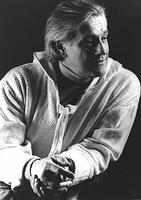
André Prévost (Joseph Gaston Charles), composer, teacher (born 30 July 1934 in Hawkesbury, ON; died 27 January 2001 in Montréal, QC. Premier prix harmony, composition (CMM) 1960.
Background
Although Ontario-born, he belongs to a Quebec family of venerable lineage; he is a great-grandson of Gustave Smith. He first studied in St-Jérôme, Que, then pursued his classical studies at the Séminaire de St-Thérèse and the Collège de St-Laurent. In 1951 he enrolled at the CMM where he studied harmony and counterpoint with Isabelle Delorme and Jean Papineau-Couture and composition with Clermont Pépin. He won the Sarah Fischer Concerts composition prize in 1959. Bassoonist in a reed trio, he obtained a Chamber Music Award from the Amis de l'art foundation, also in 1959. Assisted by grants from the Canada Council and the Quebec government, he studied analysis with Olivier Messiaen at the Paris Cons and in 1961 worked with Henri Dutilleux at the École normale.
Early Awards and Compositions
Returning to Canada in April 1962, Prévost began teaching at the Séminaire de Joliette and at the Collège des Eudistes in Rosemont. In June 1963 he obtained the Prix d'Europe for composition and in November of that year his symphonic work Fantasmes won a prize from the Amis de l'art foundation. (It won another from the MSO in 1964). After its US premiere, 17 Mar 1977 by the TS in Carnegie Hall, Harold Schonberg noted in the New York Times that 'it does convey a real urgency and is an impressive work.' During the summer of 1964 he studied electronic music with Michel Phillipot at the ORTF, Paris. In the fall of 1964 Prévost joined the Faculty of Music, University of Montreal (1964-1996). In the spring of 1964 he conceived a plan for a large musical work on 'Man and His World,' the theme of Expo 67. Shortly thereafter the work was commissioned officially by the MACQ. During the summer of 1964 he went to the Berkshire Music Center in Tangelwood where he worked and consulted with Gunther Schuller, Donald Martino, Aaron Copland, and Zoltán Kodály. In the fall of 1965 the Jacques Verdon and Gilles Manny recording of his Sonata for violin and piano received a prize at the Festival du disque in Montreal.
Premieres and Commissions
In January of 1966 Ten Centuries Concerts of Toronto, in collaboration with the Canadian Music Centre and the Canadian Confederation Centennial Commission, commissioned his Suite for String Quartet. The work was premiered in 1968 in Toronto by the Orford String Quartet. On 29 Apr 1967 Terre des Hommes, for large orchestra, three choirs, and two narrators, to a poem by Michèle Lalonde, was premiered under the direction of Pierre Hétu at the Salle Wilfrid-Pelletier (PDA) at the inauguration of the Expo 67 World Festival. Prévost resided 1972-3 near Lausanne in Switzerland, where he wrote two commissions for the CBC, Chorégraphie I premiered by the TS in 1975, and Missa de Profundis premiered by the Festival Singers of Canada and the Toronto Mendelssohn Choir in 1973. On three occasions, one of his works has been chosen as the set Canadian piece at the Montreal International Music Competition: Pyknon (1966), 'Il fait nuit lente,' an excerpt from Hiver dans l'âme (1981) and Variations et thème (1988).
By the late 1980s Prévost had composed more than 50 works, the majority of them commissions from orchestras and other organizations. Among the resulting works was the Cantate pour cordes written at the request of Yehudi Menuhin and premiered in 1987 under his direction, by the Orchestre Camerata Lysy of Gstaad at the Guelph Spring Festival during the ensemble's tour of eight Canadian cities. In January 1990, the CBC broadcast the program 'Menuhin - Prévost (produced by James Dormeyer), a creative adventure,' which traced the development of the work from its conception to its performance in concert. This program received an award at the Prix Italia in October 1990. Prévost's works have often been performed abroad, notably in France, England, Switzerland, Yugoslavia, New-Zealand, Korea, and the USA. Volume 28 of RCI's Anthology of Canadian Music (6-ACM 28), released in 1987, is devoted to Prévost's compositions.
Aesthetic
Prévost's concept of a musical aesthetic resembles that of Xenakis, in that it involves a 'world of sonority in movement.' However, his modes of expression and writing are independent of all schools and determinism. He uses contemporary techniques and writing procedures freely. The notion of 'structure,' of extreme importance to some composers, remains for him a complementary factor, an outcome, dependent upon the work itself and upon its 'life breath.' Up to the early 1990s, the whole of his output illustrated this concept.
Prévost became a member of the board of directors of the CMCentre in 1971 and president of the Groupe Nouvelle-Aire in 1973. In 1977 he received the Canadian Music Council Medal. He was named an Officer of the Order of Canada in 1986. He is a member of the CLComp and an associate of the CMCentre. An auditorium in St-Jérôme is named after him.
His final works included a Violin Concerto (1998) and Menuhin: Presence (2000) for solo cello and chamber orchestra. For a full list of compositions please refer to the CMC website.
Selected Readings
Richer, Lyse et al, André Prévost La musique que je suis (2009).

 Share on Facebook
Share on Facebook Share on X
Share on X Share by Email
Share by Email Share on Google Classroom
Share on Google Classroom
